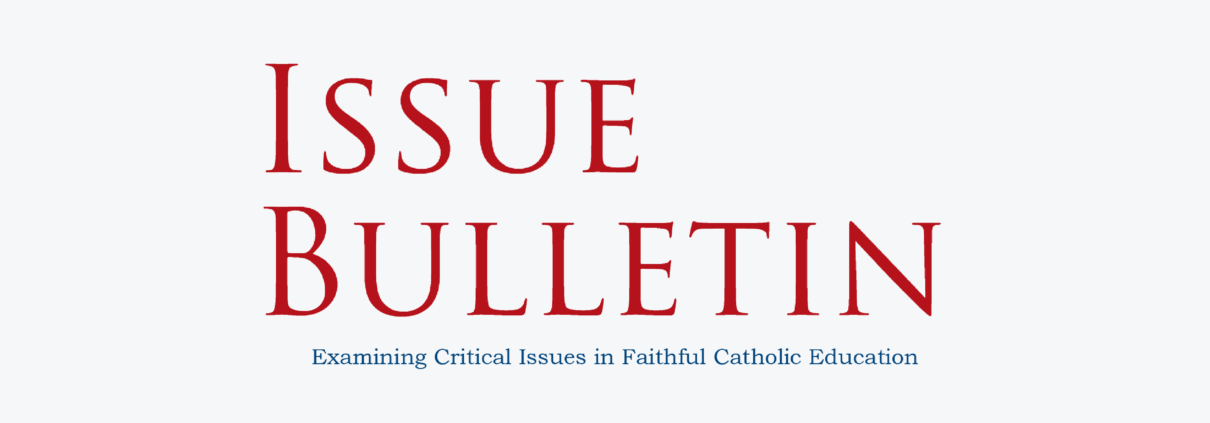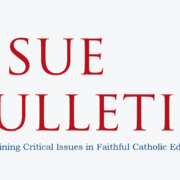Catholic Schools, Firing Policies and Teacher Misconduct
This publication is the first in a collaborative series between The Cardinal Newman Society and the Culture of Life Foundation on complex moral issues in Catholic education policy. These papers are intended to inform discussion and should not be regarded as definitive statements of policy or practice. The views expressed herein are those of the author and not necessarily those of The Cardinal Newman Society or the Culture of Life Foundation.
The question which has been in the news recently is as follows: Should teachers, faculty members or school administrators be terminated if they are found to be guilty of grave moral misconduct in their private lives?
Because each Catholic school has elements unique to itself—mission statements, constituencies, financial needs—and each employment situation is unique, and the circumstances surrounding each instance of misconduct is unique, there is no “one-size-fits-all” answer to this question. But certain consistent principles can be considered and practical measures taken to assist schools in responding well to the problem of employee misconduct. This essay discusses both.
What’s the Fuss?
Why is this even a difficult question? Why not just sack any employee guilty of misconduct, clean the slate and move on? Or why not be merciful and always offer employees a second chance? Both options could be licit; at the very least, neither is intrinsically evil.
It’s a difficult question because school officials, in seeking to do what is right, are aware that both alternatives—firing and not firing—risk causing unintentional harms that they are not interested in bringing about, and that could be very impacting on the welfare of the school and the Church.
Making a good decision means not only being realistic about unintentional harms, but assessing whether or not tolerating (but not intending) one or more of them might either violate some moral duty or be an obligation in virtue of some other duty. Public relations (PR) concerns are often foremost on the minds of school authorities, and they are certainly not irrelevant. But they are by no means the only—and usually not the most important—concerns, the foremost of which are a true concern to avoid scandal and to maintain the integrity of a school’s Christian witness.
The Fuss Is about Souls!
What’s at stake is ultimately the good of souls, especially the souls of students, and the integrity of the Catholic Church’s apostolic mission. The first duty of a Catholic school is to bear witness through educational means to the splendor of truth, especially the truths of the Christian faith. Fund raising, prestige, academic ranking and successful sports programs are important, but if school authorities forfeit their school’s true Catholic identity in their effort to achieve them, they fail in their first duty to their constituencies and to the Church, and worse, they betray Christ.
When it comes to considering termination, making a good decision can be difficult and laborious. But as I tell my seminarians, moral decision-making is about loving. And for those who exercise authority, loving means seeing and assessing all the relevant harms caused by one’s action or inaction. Why? Because every relevant harm is ultimately a harm to some human being. And it is human beings who constitute “the foundation, the cause and the end of every social institution” (John XXIII, Mater et Magistra, no. 219). Although some or even many of the foreseeable harms may not be decisive for settling questions concerning misconduct, no harm is irrelevant to these questions’ assessment.
With Whom Does Responsibility for this Decision Rest?
The development and execution of school policy fall to whoever has authority over the school’s employees, and over the school itself: e.g., members of the school’s senior administration, members of the board of directors; the superintendents of Catholic schools; and, ultimately, the diocesan bishop. There will obviously be differences in the authority structure with non-diocesan Catholic schools, but the point here is clear: those who exercise authority bear responsibility. At universities, senior faculty are sometimes also consulted, or committees set up to deal with grievances brought against faculty members.
Critical Importance of Hiring Procedures and Conduct Policies
While no set of procedures and no policy can anticipate every possible situation, schools can and should develop hiring procedures and conduct policies that establish a base-line for acceptable conduct for all employees, especially teachers, and specify clearly the results of violating the policies. In dealing with the problem of employee misconduct, this is arguably the most important practical measure a Catholic apostolate can take to guard its religious identity.
Catholic Apostolates and Mission-Centered Hiring Policies
An “apostolate” is a community of Christian witnesses. A “mission” is the community’s work. Catholic schools and universities are—or ought to be—apostolates of the Church.
Hiring procedures should be in place to ensure that all employees support the apostolic identity and mission of the institution. This is what the term “hiring for mission” means. Although some jobs are more closely associated with the oral and public communication of the school’s mission, all employees share responsibility for protecting and promoting it.
This does not mean that all employees must be practicing Catholics. However, it does mean, ordinarily, that a majority of employees should be practicing Catholics. Otherwise, it will be difficult to ensure a consistent expression of the school’s mission and guarantee continuity of Catholic identity over time. All other employees should understand, believe in, and be willing to support, the school’s mission.
It follows that:
School authorities ought to hire only people capable of cooperating in carrying out the school’s mission, and that means that they cannot be known to be persisting in any behavior or commitment objectively incompatible with Catholic moral teaching.
This is especially important for the hiring of faculty, as well as administrators who work closely with students (e.g., counselors).
Conduct Policies
This requirement should be supported by a clearly defined, written moral conduct policy. It should be built into the job description and be an essential and legally binding part of any and every employment agreement.
If the school’s policy is:
- clearly published and consistent with Catholic Church teaching;
- closely keyed to the institutional mission statement; and
- consistently and non-arbitrarily applied,
then there will be structures in place to guide decision making in circumstances where polices are violated. Absent such a policy, each case will likely be treated differently, depending on the matter at issue and what sort of employment agreement and undertaking exists. This leaves the institution much more vulnerable to running afoul of the law or being open to a civil suit.
Private vs. Professional Misconduct
My analysis is principally concerned with what school authorities should do in cases of grave misconduct in the private lives of employees. By “private” I mean life outside of professional employment. There will be different degrees of private misconduct (e.g., acts one doesn’t want known vs. ones that are flaunted even though they are not on “company time”); this essay concerns all degrees of “private” misconduct. Once questionable behavior comes to the attention of someone who has authority over the individual, at that point the private becomes public for our purposes.
This essay does not consider misconduct in one’s professional life (e.g., sexual harassment on the job), though that also needs to be handled with consistency and good judgment. Nor does it address the duties of school authorities to comply with law enforcement in cases where employees are undergoing criminal investigation.
“Grave” Misconduct: Serious Sin, Intransigence, Scandal
In moral theology, referring to a sin as “grave” implies it is a mortal sin. I am using the term grave here more restrictively. By “grave misconduct” I am referring to deliberate behavior that meets the following three conditions: first, it is gravely wrong (serious or mortally sinful in type); second, the employee is intransigent in doing it; and third, the situation is potentially an occasion of scandal.
In general, I think that actionable instances of private misconduct should meet all three conditions.
The first condition needs no explanation. But the next two deserve comment.
Intransigence means that some misconduct is unapologetically habitual. Some examples of behavior meeting the condition of intransigence could include:
- Single employees who get pregnant or get someone pregnant and defend their behavior; cohabitating in sexually-active, non-marital relationships;
- Employees engaged in promiscuous activities with same sex partners or with partners of the opposite sex;
- Employees engaged in an adulterous relationship;
- Employees who advocate for public policies explicitly aimed at advancing or defending abortion rights, same sex marriage, polygamy, euthanasia, experimenting on, freezing or destroying human embryos, cloning, or other gravely immoral acts.
Intransigence is not met if an employee engages in some misconduct, but expresses a sincere desire and resolve to change. For example, if a female employee gets pregnant out of wedlock, or a single male gets a woman pregnant, but she or he sincerely repents, resolves to keep and raise or support the child according to Christian principles, or place the child for adoption, and is willing publicly to support the Church’s moral teaching on marriage and sexual morality, intransigence is not a factor.
Scandal means that the private behavior, if known, could destroy people’s faith, undermine the school’s Catholic identity and be an inducement to sin, especially to the students. Some sins today are particularly dangerous to the welfare of souls. Abortion and promiscuity—especially homosexual behavior—because they represent evils that many say are goods, can easily be occasions for scandal. Since the indissolubility of marriage is also widely rejected, and even doubted by some Catholics, another act especially apt to give scandal could be actively dating when divorced without an annulment or dating an un-annulled divorced person. If school authorities appear to be indifferent to these behaviors, the consequences can be unacceptable.
Intransigence is not absolutely necessary
As I said, I think that the three conditions ordinarily should be met before instances of misconduct become subject matter for dismissal.
Is this to say that grave misconduct by employees who do not express intransigence is not subject matter for dismissal? No. If school authorities have good reason to believe that an immoral act committed by an employee will cause scandal, then even if the employee is repentant, the welfare of the school may require dismissal. Obviously, the greater the risk of scandal, the more seriously dismissal must be considered.
However, just as it is true that there is more joy in heaven over one sinner who repents than over ninety-nine righteous persons who need no repentance (Lk. 15:7), so it is true that Christians rejoice when their brothers and sisters repent. It seems to me that evil-doing that is frankly, publicly and sincerely rejected through true repentance is rarely an occasion for another’s sin; and very often it is an occasion of moral growth for wrongdoers and those around them.
It follows that:
If school authorities think that scandal in the case of a repentant employee can be reasonably obviated by measures short of dismissal, they should adopt those measures. If they do not think scandal can be avoided, then they may be obligated to terminate the employee’s employment.
Two Moral Requirements: Due Diligence and Moral Certitude
School authorities can come to suspect an employee of grave misconduct in several ways. Employees might publicize their behaviors (including their views) on social media, by email or in scholarly publications. Or, a member of the school community or somebody outside of it might accuse them of misconduct.
In either case, school authorities ought to carry out due diligence and only act when reasonable doubt has been removed.
Due diligence
The first priority should be to establish beyond a reasonable doubt whether or not the suspicion is true. Christian charity requires that school authorities should assume the best of their employees until evidence proves otherwise.
The practice of anonymous accusation, not uncommon in Catholic institutions, should be rejected in all but the most extraordinary circumstances (e.g., in cases of danger to the informer). Although it may be fair to ask authorities to maintain confidentiality when one is revealing sensitive information about oneself, if one accuses another of grave misconduct, one should, in justice, be willing to be made known to the accused. And the accused, also as a matter of justice, should be given the opportunity to face his or her accuser. It is not only gravely unjust—evil—to falsely accuse another; it is also unjust for authorities to accept and act on an accusation of grave misconduct without undertaking due diligence to establish its verity.
Upon a revelation of misconduct, school authorities ordinarily should first approach the employee and ask him or her charitably and without dissembling: “Did you do X?” or “Are you doing Y?” If rumors are flying about, but no solid evidence has been presented, it would still be acceptable to ask the employee directly whether there is anything to the rumors.
Unless school authorities have reasons to suspect an employee’s honesty, a denial of guilt should be taken as sufficiently establishing the truth.
Moral certitude
Only after guilt has been established beyond a reasonable doubt—that is, when authorities have moral certitude of their employee’s guilt—should disciplinary measures be initiated.
And I do mean should be initiated.
Schools must not close their eyes to the grave immorality of their employees hoping it will go away. It is not uncommon for schools to ignore the private but scandalous behavior of their employees, not acting upon it until the situation grows into an ugly PR problem, at which point, scandal has probably already occurred.
Although they should not take action in the absence of due diligence and moral certitude, as soon as these are fulfilled, they should not delay action because of a fear of unpleasant results.
Confidentiality vs. Secrecy
A common cause of disunity in Catholic educational institutions is inadequate communication between administration and other employees, especially faculty. Although every person has a right to a good name, and idle curiosity should not be fed, confidentiality should not be taken to the extreme of secrecy.
All school employees share responsibility for contributing to, and maintaining, the conditions of the common good of the institution. Consequently, they have a right to know at least the minimal facts of serious situations that bear upon that common good.
If a teacher or administrator is convicted of, and dismissed for, misconduct, I believe it is best for school authorities to give other school employees at least minimal information about the event (e.g., “so and so has been dismissed for misconduct”). Details ordinarily need not be divulged. Employees should be admonished not to give over to gossip or listening to gossip, or calumny or reviling. They should be told that if they feel the need to discuss the situation further, they are free to contact proper channels within or outside the institution.
Harmful Effects of Terminating or Not-Terminating an Employee
I said above that making a good moral decision means assessing the potential consequences of adopting, or not adopting, alternatives under consideration. In this final section, I elaborate on the kinds of unintentional harms that may follow upon the decisions to dismiss or not dismiss an employee for misconduct.
If there is a clear school policy, as I recommend above, some of the harms (especially in clear-cut cases of misconduct) may be less material to the analysis, but no reasonably-foreseeable harm of our actions is irrelevant to conscientious moral analysis.
Therefore, this final section is included to educate readers, especially those who hold positions of authority in Catholic education, of the types of issues that should be considered when undertaking a moral assessment of complex issues such as the one we are considering here.
Not Consequentialist or Proportionalist Reasoning
It bears noting that considering the harmful consequences attendant to a decision to terminate or not terminate is not consequentialist reasoning, the aim of which is to determine by appeal to consequences whether or not intending evil (as an end or means) is licit ‘under the circumstances.’ Evil alternatives should never be chosen and consequently should not be the subject matter of moral deliberation. As soon as we conclude that some type of behavior would be intrinsically wrongful to choose, we should exclude it from our range of potentially-acceptable choices.
But once we have done this, we must have a reasonable concern for consequences.
Effects of terminating employment
What harmful (unintended) side effects are likely to be caused by terminating an employee for misconduct?
- Effects on school pedagogy: perhaps lose a good teacher;
- Effects upon students: alienate students who feel sympathy for the teacher;
- Effects upon faculty/administrators/other employees: generate or strengthen unhealthy factions within the institution;
- Effects on institution/diocese/Church: employee becomes a cause célèbre:
- Provides an opportunity for those outside the institution who oppose the Church’s teaching to accuse the institution of intolerance, mean-spiritedness, unmercifulness, hypocrisy, etc.
- Provokes lawsuits with financial implications for the institution.
- Effects upon the teacher: stigmatizes him/her which may make it hard to find a new job; perhaps precipitates financial difficulties, relational difficulties, etc.;
- Effects upon the innocent:
- If a teacher gets pregnant, termination may cause harm to the unborn child; if he/she has other children, hardship may come to them.
- If termination is carried out in a heavy-handed way, those in the community who are weak or ignorant, but good-willed, may be alienated from the Church.
If one or another of these harms can be avoided by undertaking remedial interventions that are not gravely burdensome to the institution, then, when a decision is made to terminate an employee for misconduct, school authorities should consider ways to make those interventions.
Effects of not terminating employment
What are some foreseeable unintentional harms of not terminating employment?
- Possibility of scandal: continuing employment may tempt others to sin:
- Effects upon students: Students who see the school apparently tolerating the behavior may conclude that the behavior is legitimate; may even imitate it.
- Effects on others outside the school: not taking decisive action can make the wrongdoing seem more acceptable, provide material for rationalization and self-deception, tempt the weak, and confuse the doubtful or ignorant.
Moral principle: if school authorities have good reasons to conclude that not taking decisive action, including termination, will cause scandal, then ordinarily they have an obligation to take appropriate action. If the risk of scandal can be obviated by measures short of termination, then fear of scandal need not be decisive.
- Effects upon the school’s mission: by not taking decisive action, the school may fail in its duty to bear perspicuous witness to gospel values. Catholic schools, as a matter of basic identity, have an obligation to offer credible and charitable witness against these types of wrongdoing and for the goods violated by the misconduct.
Moral principle: if school authorities have good reasons to believe that their school’s apostolic integrity (i.e., its ability to carry out its mission) will be compromised by not taking decisive action, then ordinarily they are obliged to take that action.
- Effects upon the school’s Catholic reputation: by not taking decisive action the school may appear to be indifferent towards certain kinds of evildoing and hence lose the respect (as a Catholic institution) that all true apostolates deserve. For schools that have already lost this respect, school leaders should consider their response to employee misconduct in light of the need to restore their good (Catholic) name.
- Effects upon school authorities themselves: those in authority should ask whether tolerating grave misconduct in their employees would cause themselves (or other employees) to grow psychologically coarsened in relation to the goods/persons adversely affected by the wrongdoing, or cynical towards the duty to “fight the good fight” against certain widespread kinds of evil. They should take appropriate action against such coarsening and cynicism in themselves (and in their employees, especially faculty members).
- Effects upon school policy: not taking decisive action may establish a dubious precedent for resolving future cases; this should be avoided.
- Effects upon other schools: other schools may follow the example, when in fact their situations are quite different and demand a different response.
- Effects upon the wrongdoer: if wrongdoers are not disciplined, they may be strengthened in their wrongdoing and carry out further wrongful acts.
- Effects upon community harmony:
- Members of the wider Catholic or Christian community, who hear about wrongdoing at a Catholic school and conclude that the school is indifferent to it, may grow alienated from the school and from relevant Church authorities.
- Disharmony may also be caused between school authorities and possible victims of the wrongdoing, e.g., a spouse who was dumped by a school employee may perceive the school’s failure to terminate the spouse as the school’s indifference towards, or support for, the wrongdoing.
Other Morally Relevant Questions
A few other questions should also be asked:
- Are there special circumstances that strengthen the school’s reasons to terminate or not to terminate an employee? For example:
- Is the employee especially vulnerable at this time for reasons unrelated to the misconduct?
- Or is the misconduct so grave and the potential harms so widespread that attending to “special circumstances” might be unfair to others?
- Is the employee recidivist in wrongdoing or is this a first offense?
- Does he or she as a rule publicly support Catholic teaching or criticize it?
- Is the employee close to retirement?
- If so, could the retirement be moved forward in such a way as to render unnecessary a precipitous termination?
- In some instances, however, the institution may be obliged to say something publicly about the retirement, so that others do not come away with the mistaken belief—if it is indeed mistaken—that the authorities have done nothing about the misconduct.
- Can termination be carried out more discreetly? Could the employee be let go at the end of the contract year, rather than immediately, without undue harmful effects being caused?
- Do school authorities have good reasons to believe that terminating employment may prevent or mitigate future wrongdoing by the employee?
- Certain kinds of decisive action may be advisable, and even obligatory, if doing so is likely to prevent future evildoing.
- If, however, the intervention is unlikely to have any positive effect on the employee, this may not be a consideration.
Conclusion
This is an analysis of Christian principles important for properly understanding issues surrounding the termination of teachers/faculty, school administrators and other employees who have been found guilty of grave moral misconduct in their private lives.
The principles are offered to assist school authorities to establish clear and consistent policies regarding moral behavior for employment contracts, faculty handbooks, or other documents, which govern the conduct of school employees. They also may be useful as a basis for the establishment of employment law respecting both the religious freedom of Catholic educational institutions and the rights of employees.





